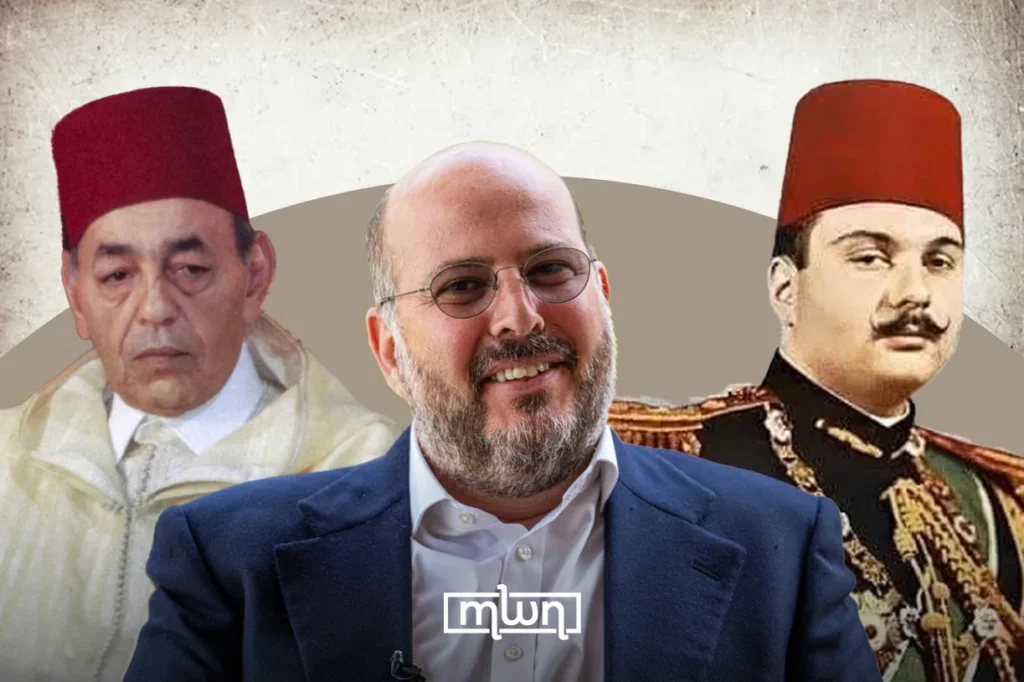Doha – Prince Mohamed Ali Farouk, grandson of the last king of Egypt, has returned to live in Cairo, and thanked for the decisive intervention of the late King Hassan II, who enabled his birth in Egypt during the exile of his family.
“Thanks to the support of King Hassan II, who intervened with President Sadat, my mother Fadila was authorized to be born in Cairo”, the 46-year-old Prince told AFP in French during a recent interview.
This diplomatic gesture in 1979 made him the first male member of the direct line of the royal family to return to Egypt since the revolution of 1952.
The prince, who now has an Egyptian passport that will be granted in 2020, establishes itself in Cairo after years of life abroad, mainly in France. His return marks a symbolic reconciliation between Egyptian royalists and republican eras, he says.
“For my father, Egypt was a lost home. For me it is a rediscovered, ”says Mohamed Ali, who heads a consulting company for technical real estate in Paris.
His father, Fouad II, became king after the age of King Farouk of King Farouk in 1952, who briefly decided with a regional council to the abolition of the monarchy in 1953.
The prince’s return to Cairo was encouraged by his wife, Princess Noal Zaher from the royal family of Afghanistan.
“It was Noal who supported me during my reflection. She wanted to live in the Orient and wanted our children to grow closer to her roots, ”he reveals.
From the dining table tension to military threats: the Hassan II Nasser Years
The prince’s gratitude towards King Hassan II comes from a layered history of antagonism between Morocco and Egypt’s leadership.
Their relationship was characterized by confrontations that, according to French diplomatic archives, started a diplomatic dinner and escalated to military threats.
The first spark lit at the end of the 1950s when Hassan II, then Crown Prince, President Nasser, struggled with the cutlery at a state dinner in Morocco.
“I do not think so monarch Noted that Nasser’s revolution pointed out – a comment that set the tone for years of strenuous relationships.
The tension reached its peak during the Sand War between Morocco and Algeria from 1963, as Nasser used About 2,000 Egyptian troops to support Algeria against Morocco.
Among them was the future Egyptian President Hosni Mubarak, at that time a military officer who was captured by Moroccan armed forces after his plane was lost within Moroccan territory.
An attempted reconciliation in March 1965, while Hassan Ii’s visit to Cairo, was missing dramatically. According to French diplomatic documents, what started as a warm meeting to open hostility, when Nasser demanded that Morocco and West Germany were related to his support for Israel.
The rejection of Hassan II led to an express threat to Nasser, who warned that Arab leaders would “be convicted of the attitude of Egypt to disappear”, and reminded the Moroccan king that Egyptian armed forces were “on the doorstep in Algeria”.
Hassan II alarmed the meeting.
Relationships only improved after Anwar Sadat and later Hosni Mubarak took over the presidency of Egypt. However, President Abdel Fattah briefly reappeared the Echos of past tensions Al-Sisi.
Three incidents were particularly worrying: Sisis early diplomatic visit AlgeriaThe appearance of the Egyptian media delegations in Tindouf camps and a controversial photo of Sisi with Polisario leadership at a summit of the African Union in Equatorial Guinea.
The Egyptian military officers justified these movements as a necessary security coordination with Algeria to combat arms trade and to tackle the threats in Libya. Egypt has since confirmed His support for the territorial integrity and sovereignty of Morocco via the western Sahara.
Today Prince Mohamed Ali focuses on the rehabilitation of his family’s image and rejects all political ambitions.
“I just want to work on the rehabilitation of the image of my royal family and help to preserve and transmit their historical, cultural and artistic heritage,” he claims that “150 years of history is honored to be honored.”





